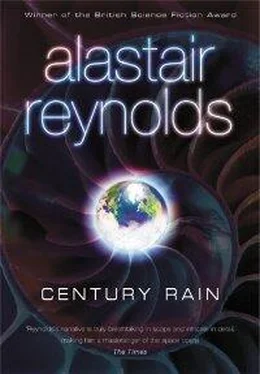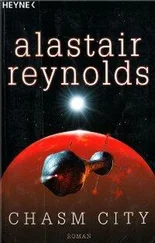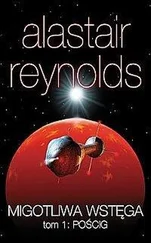“They’re definitely weakened,” she said, between breaths. “They can’t keep extending their armour indefinitely. Unfortunately, I’m running out of power.”
They were only a dozen paces from the shuttle, taking temporary shelter behind a mass of collapsed metal. The door was still blocked by the flexing form of the main tentacle. There was no way they’d get through that alive, not after what the armour had done to Cassandra.
“We can’t give up,” Floyd said.
“We’re not going to. But these controlled bursts aren’t doing enough. I’ve got enough charge left in the weapon for six shots at normal discharge strength. I’m going to blow the whole lot in one go. It’ll fuse the weapon, but that doesn’t matter now.”
“Do whatever you must.”
“It won’t kill them,” she said. “It’ll only take the wind out of their sails.”
She made the necessary adjustments to the weapon. “No matter what happens,” she said, “I want you to run like hell for that airlock. Get inside the ship and don’t hang around if I’m not behind you.”
“I’m not going anywhere without you.”
“The machines will take care of you. Let’s just hope it doesn’t come to that.”
The tentacles lashed above them, and then began to extend themselves downwards, narrowing to sharp, rapierlike blades as they descended.
“Whatever you’re going to do,” Floyd said, “now would be a good time to do it.”
She levelled the gun, holding it at arm’s length, and aimed at the merged body of the Slashers. The gun fired just as it had before, but with much greater intensity. The beam of light daggered into the conjoined figures, boiling off layers of armour in a flash of hot silver. Then the gun itself erupted with light, flaring in Auger’s hand. She held on until the discharge ended and then flung the molten, spitting thing away with a howl of anger or pain.
“Run!” she shouted.
Before it died, the weapon had clearly inflicted grave harm on the two Slashers. Their armour was wobbling, oscillating around them like jelly. The sharp-edged tentacles had pulled back into the main mass, while the tentacle guarding the door had been severed and was thrashing around like a decapitated snake. The shuttle door was now unguarded. Floyd dashed over to it and pulled down the chunky striped handle that was obviously meant to be used for opening the door from the outside. To his relief, the door slid up, recessing into the hull and admitting him into the small compartment where the air was exchanged. He looked over his shoulder, expecting Auger to press against him at any moment.
But she wasn’t there. She had barely moved from the position where she had fired the gun. She lay on her side, one gloved hand a scorched black ruin where the gun had destroyed itself. She was crawling across the iron decking, one pained centimetre at a time.
“Floyd,” she said, with obvious difficulty. “Leave now.”
“I’m not leaving you here.”
“I’ll take care of Auger. Just get yourself out of here.”
He looked back at the remnants of the search party. One of them—the man Caliskan had injured earlier—now lay on the ground, devoid of armour. The remaining volume of armour had huddled around the other Slasher, but there was something nervous and imperfectly co-ordinated about the way it flowed and shaped itself, as if the armour, too, was hurt. But the severed piece was still writhing and whiplashing its way back towards the main mass. When it got there, the armour would probably become stronger again…
Floyd left the shuttle and ran across the observation deck to Auger.
“Get out of here,” she said.
He knelt down and picked her up. The effort was nearly too much for him—they were both wearing heavy suits and Floyd hadn’t exactly been training for this kind of thing.
“No one’s leaving anyone behind,” he said, trying to shift her weight in his arms so that they wouldn’t both topple over when he stood. “I noticed you weren’t in a hurry to abandon Auger the way you did your own body.”
“My body was mine to throw away,” she said. “You just don’t do that with someone else’s.”
Staggering as he stood, Floyd found his footing and started back towards the waiting ship. “Even if it kills you?” he gasped, the exertion making his breathing ragged.
“Don’t talk, Floyd. Just walk.”
He reached the door of the shuttle and lowered Auger into the internal chamber. He forced himself into the same tight space and found the counterpart to the striped handle he’d pulled on the outside. He yanked it down and waited for the door to lower itself.
Down below, at the base of the tower, the stricken Slasher ship had finally reached the ground. As the door slid down, Floyd watched it die, burying its nose in ice and fire. The carcass collapsed in on itself, blossoming with a thousand miniature explosions. Next to it, the tower rattled in sympathy, dislodging even more of its rickety superstructure.
“I think Guy de Maupassant’s about to get his dying wish,” Floyd said.
He had one last view of the tower and the Champ de Mars as the shuttle hauled itself into the clouds. Enormous explosions ripped open what remained of the body of the crashed Polity ship. Perfectly circular shockwaves raced away from the scene, out towards the perimeter shield. Paris quivered. Slowly, like some great wounded giraffe, the tower began its terminal collapse. One of the legs supporting the third-stage deck buckled, splintering into a million iron shards. The other three legs could not support what remained of the structure, although for a few seconds it looked as if they might. But a process had now begun that could have only one outcome. After centuries of stalemate, gravity was winning over twisted iron girders and rusted iron bolts. The tower began to lean more acutely, and the remaining legs slowly began to bow under the conflicting stresses. Hundred-ton girders popped free, twanging into empty space like flicked playing cards. As thousands of tons of metal slammed into the ground, a veil of powdered ice rose hundreds of metres into the air. It served as a kind of screen, camouflaging the tower’s final moments. Floyd saw the third observation deck tilting into that whiteness, caught in a stutter of jagged lightning, and then he looked away, some part of him unable to watch until the end.
He decided, for all its faults, that he preferred his own Paris.
It was such a shame that he would never see it again.
“I appreciate that circumstances might be better,” said the man in the white captain’s uniform, resplendent with epaulettes and sleeve braids, “but I still want you to feel at home on this ship.”
Tunguska offered Floyd a cigar from a little wooden humidor. Floyd declined the cigar, but accepted a shot of whisky. They sat in upholstered armchairs in the luxuriously appointed parlour room of what was either an ocean liner, airship or transatlantic flying boat. Through the square windows, only a rain-washed darkness was visible, and the droning hum of engines was sufficiently nondescript that any of the possibilities could have applied. Ceiling fans stirred the air above them, rotating with laboured slowness.
Floyd drank half his whiskey. It wasn’t the best he’d ever tasted, but it still took the edge off his day. “What’s the news on Auger?” he asked.
“She’s stable,” Tunguska said. “The physical injury from the malfunctioning weapon was easily attended to, and ordinarily wouldn’t have caused any difficulties.”
“But on this occasion?”
“She went into shock. It’s quite possible that she would have died without intervention from Cassie’s machines. As it is, the machines have consolidated their hold on her. It’s like a coma.”
Читать дальше












